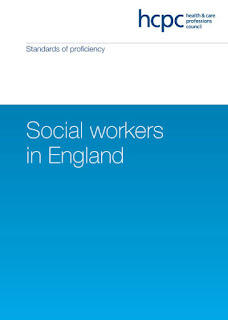Social worker and HCPC Council member Robert Templeton discusses the challenges of social work regulation and the professional importance of a strong set of Standards of Proficiency.
One of the challenges for professional social work regulation is that for the most part the public, the media and the government are only aware of its importance when things go wrong. This is due to a variety of reasons perhaps one being the regulatory landscape, which is complicated and often shrouded in impenetrable language. However the ideas behind professional regulation are simple, it is about protecting the public, in other words stopping bad things from happening.
The Heath and Care Professions Council (HCPC) Standards of proficiency for social workers in England play an important role in public protection as they establish threshold standards necessary for safe and effective practice. They set out what all social workers in England should know, understand and be able to do when they complete their social work training so that they can register with the HCPC. They set clear expectations of a social worker’s knowledge and abilities when they start practicing. Each profession regulated by HCPC has a set of proficiency standards, which run alongside the overarching standards of standards of conduct, performance and ethics and standards for continuing professional development, which apply to all the professions HCPC regulates.
The standards of proficiency for Social Workers in England were first published in 2012 prior to the opening of the HCPC Register on 1 August 2012. HCPC committed to reviewing the standards of proficiency once they had concluded a three-year programme of visits to pre-registration education and training programmes previously approved by the General Social Care Council (GSCC).
The key challenge when writing and reviewing these standards is to ensure they reflect the values of social work, the complexity of practice and diversity of contexts and settings in which social workers practice. They must also reflect existing requirements and training provisions. Under the Health and Social Work Professions Order 2001 legislation, registration with the HCPC means that someone is able to use the protected title ‘social worker’. As a result, the standards of proficiency describe the knowledge and skills needed to practise as a newly qualified social worker at a threshold level.
There are similar standards published by other organisations, whilst complementary, they often have a different purpose. For example since the closure of The College of Social Work the British Association of Social Workers now own the Professional Capabilities Framework (PCF). Whilst the standards of proficiency are about the threshold required at entry to the profession, the PCF is designed to support social workers throughout their careers. The PCF acts as an overarching framework by describing the capabilities expected of a social worker at key career stages. These include professionalism, values and ethics, knowledge, intervention and skills and professional leadership. There is some overlap with the standards of proficiency because the PCF includes a description of the competencies expected by the end of a social work student’s last placement.
There is also the Knowledge and Skills Statements (KSS) published by the Chief Social Workers for Children and Families and for Adults. In contrast to the standards of proficiency they describe the knowledge and abilities expected of social workers who work with children and families, and those who work with adults. They describe what is required by the end of a newly qualified social worker’s first year in practice - the Assessed and Supported Year in Employment (ASYE).
As part of the review, HCPC looked at the PCF and KSS to identify whether there were any gaps in the standards of proficiency or any existing standards that should be amended. The standards were also compared to those the HCPC had recently reviewed for the other professions, such a Psychologists and Occupational Therapists, to check whether there were any changes made which would be equally applicable to the social work standards.
Under the Children and Social Work Bill regulation of social workers in England will move from the HCPC to become the responsibility of a new organisation called Social Work England. However, until this happens HCPC continues to be our regulator. This means HCPC’s Standards of proficiency together with the Standards of conduct, performance and ethics and the standards for continuing professional development are the standards which every registrant must meet in order to become registered, and must continue to meet in order to maintain their registration. You can find more information on the government’s proposed changes
here.










